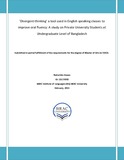| dc.contributor.author | Hasan, Nehal Bin | |
| dc.date.accessioned | 2016-10-02T04:15:05Z | |
| dc.date.available | 2016-10-02T04:15:05Z | |
| dc.date.copyright | 2016 | |
| dc.date.issued | 2015-02 | |
| dc.identifier.other | ID 13177003 | |
| dc.identifier.uri | http://hdl.handle.net/10361/6492 | |
| dc.description | This thesis report is submitted in partial fulfillment of the requirements for the degree of Masters of Arts in Teaching to Speakers of Other Languages, 2016. | en_US |
| dc.description | Cataloged from PDF version of Internship report. | |
| dc.description | Includes bibliographical references (page 59-63). | |
| dc.description.abstract | The globalization of English and a growing demand for competent English language users in the
job markets have placed a greater emphasis on English language teaching in Bangladesh. This
article examines the language learning techniques in English speaking classes in response to the
global influence at undergraduate level of Bangladeshi university. A survey and focused group
discussion (FGD) based on an observation of recordings with the students have been done to
draw the conclusions of students f implicit and explicit understanding of speaking lessons. Also,
an interview of the teachers has been conducted. Needless to say, all the methodologies were
given an equal importance in the research with the equal contribution to the found data. This
study also observes if gdivergent thinking in English h can be used in the speaking classes as a
tool to improve the oral production of the students. Findings from the study with relevant
references from the literature suggest that the students have been overall satisfied with their
speaking classes. Cross ]functional analysis of teachers f response and students f response suggest
that the tools which have been used in the classes have been successful to initiate more
spontaneous communication and improve student fs ability of oral production. This has also
been found from the FGD and the experiment of divergent thinking which has been done with
the students that divergent thinking in English may influence language learning although its
functionality and application in speaking classes of undergraduate level students of Bangladesh
haven ft been proved. The study of socio ]psychological variables and relative tests of
brainstorming and divergent thinking to language processing will probably provide additional
insights on the topic. | en_US |
| dc.description.statementofresponsibility | Nehal Bin Hasan | |
| dc.format.extent | 67 pages | |
| dc.language.iso | en | en_US |
| dc.publisher | BRAC University | en_US |
| dc.rights | BRAC University thesis are protected by copyright. They may be viewed from this source for any purpose, but reproduction or distribution in any format is prohibited without written permission. | |
| dc.subject | ELT | en_US |
| dc.subject | Divergent thinking | en_US |
| dc.subject | Brainstorming | en_US |
| dc.subject | Speaking | en_US |
| dc.title | 'Divergent-thinking' a tool used in english speaking classes to improve oral fluency: a study on private university students at undergraduate level of Bangladesh | en_US |
| dc.type | Thesis | en_US |
| dc.contributor.department | BRAC Institutes of Languages | |
| dc.description.degree | M. in TESOL | |

